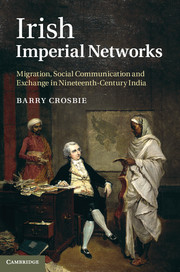Book contents
- Frontmatter
- Contents
- Preface
- Acknowledgements
- Abbreviations
- 1 Introduction
- 2 The business of empire
- 3 British overseas expansion, Ireland and the sinews of colonial power
- 4 From trade to dominion
- 5 Religion, civil society and imperial authority
- 6 From Company to Crown rule
- 7 Imperial crisis and the age of reform
- 8 Conclusion
- Glossary
- Bibliography
- Index
- References
6 - From Company to Crown rule
Published online by Cambridge University Press: 05 December 2011
- Frontmatter
- Contents
- Preface
- Acknowledgements
- Abbreviations
- 1 Introduction
- 2 The business of empire
- 3 British overseas expansion, Ireland and the sinews of colonial power
- 4 From trade to dominion
- 5 Religion, civil society and imperial authority
- 6 From Company to Crown rule
- 7 Imperial crisis and the age of reform
- 8 Conclusion
- Glossary
- Bibliography
- Index
- References
Summary
Introduction
From the late 1840s onward, a greater number of Irish Catholics began entering imperial service in India, due in part to the introduction of open-competitive examination in place of the old system of patronage. This influx served to balance the numbers of Irish Protestants who had passed through to India via Trinity College Dublin (TCD), the Royal Belfast Academical Institution and the Universities of Edinburgh and Glasgow. The large number of successful Irish candidates who obtained employment in India at this time was aided considerably by Irish universities and colleges (including the non-denominational Queen’s College in Belfast, Cork and Galway established in 1845) who were quick to seize this opportunity, and subsequently tailored their curriculum to the specific requirements of the entrance examinations. In part, this drive mirrored a desire among the rising Irish middle classes to obtain careers in the Empire, but it also reflected a strong interest within Irish universities and colleges at the time to promote learning in oriental languages, Indian history, geography, zoology and the natural sciences. In turn, increased Irish numbers in the civil and medical services (including the subordinate colonial services) gave rise to various Irish knowledge communities and more sophisticated networks of intellectual exchange that contributed to the dissemination of antiquarian, ethnographical and medical knowledge throughout the British Empire.
The Indian Medical Service (IMS) was one of the principal scientific agencies in India in which many educated Irish people sought employment during the latter phase of the Company period and under Crown rule. Company surgeons and their successors provided a large proportion of the botanists, geologists and surveyors who travelled to India. It was partly because of their wide-ranging scientific interests that medical personnel played such a vital role in the European investigation of the Indian environment (including its topography, climate and disease). In comparison to other areas of scientific enquiry, medicine directly engaged with the social, cultural and material lives of Indian people. While recent studies of the history of colonial medicine in India have concentrated heavily on individual subject areas such as issues of tropical medicine, virtually none of these works have taken into account the wider importance of the medical traditions and practices in regions such as Scotland and Ireland, two of the principal areas of the British Empire where Company surgeons and colonial scientists in India had been born and educated.
- Type
- Chapter
- Information
- Irish Imperial NetworksMigration, Social Communication and Exchange in Nineteenth-Century India, pp. 169 - 204Publisher: Cambridge University PressPrint publication year: 2011



